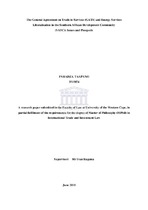| dc.description.abstract | Increasing energy needs globally have recently led to an interest in effectively bringing energy services in the trading system. Energy services were part of the Uruguay Round of negotiations, whose main achievement was the General Agreement on Trade in Services(GATS). The objective of the GATS is to achieve progressive liberalisation and reduction or elimination of trade barriers of all services sectors, including energy services. The GATS has made commendable progress in liberalising many service sectors, however it has not made meaningful progress with energy services. Furthermore though the SADC region engages in
energy services trade through bilateral and regional agreements, a variety of barriers inhibit major successes from being achieved. Effective energy services trade and liberalisation has therefore proved problematic both at the multilateral, regional and bilateral level. This study,seeks to investigate why energy services liberalisation and trade at the multilateral, regional and bilateral level is problematic, with a particular focus on the SADC region. | en_US |

